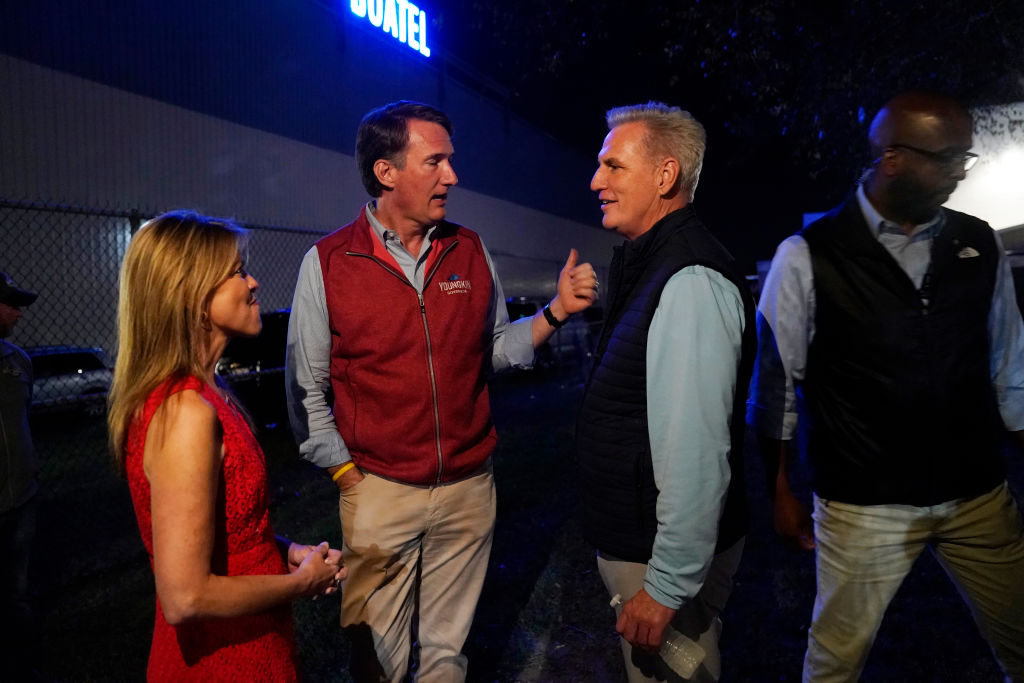Happy Friday! If this newsletter isn’t enough to satisfy your Dispatch Politics craving, check out this week’s episode of the Dispatch Podcast, where all three of us chat about this week in the presidential race and Capitol Hill.
Up to Speed
- With just eight days left to avert a government shutdown, there’s little sign House Speaker Kevin McCarthy is making progress with the splinter group of hardliners who oppose a short-term spending package of any kind. On Thursday, a handful of these broke with their party again to spike a military appropriations bill that McCarthy believed had sufficient support to pass.
- Some more moderate Republicans are threatening to break ranks and work with Democrats to avoid a shutdown if McCarthy can’t get the hardliners in line. Rep. Mike Lawler, the New Yorker who has emerged this month as the most strident internal critic of the GOP conference’s dysfunction, tweeted this morning that he “will work to pass a bipartisan CR next week, so that Congress can continue to do its work on the single subject appropriations bills while not inflicting pain on the American people.”
- Meanwhile, former President Donald Trump has thrown in with the obstructionists, posting on his social media website Truth Social Thursday that “Republicans in Congress can and must defund all aspects of Crooked Joe Biden’s weaponized Government.” “This is also the last chance to defund these political prosecutions against me and other Patriots,” Trump went on. “They failed on the debt limit, but they must not fail now.” While president, Trump sparked the longest government shutdown in American history while trying to secure congressional funding for his border wall, before ultimately deciding he could order it built without congressional approval.
- Public opinion polling hasn’t given President Joe Biden much to smile about lately in a hypothetical rematch with Trump. But a pair of fresh surveys in two battleground states show Biden outpacing his 2020 rival. In New Hampshire, Biden led Trump 52 percent to 40 percent. In this University of New Hampshire poll for CNN, the president garnered the support of 94 percent of Democrats; his predecessor was supported by 79 percent of Republicans. In Pennsylvania, a poll from the Republican firm National Public Affairs showed Biden leading Trump 47 percent to 45 percent.
- Nikki Haley, the former South Carolina governor and U.N. ambassador, is strengthening her criticisms of Trump, calling him “thin-skinned,” “easily distracted,” and “weak in the knees” on Ukraine in a series of campaign stops in New Hampshire Thursday. Haley and the rest of the field still trail Trump by an enormous margin in most primary polls, but Haley has seen her numbers rise since the first presidential debate.
- Vivek Ramaswamy, the presidential contender who claimed during the first debate that his competitors for the Republican nomination are all “bought and paid for” by their donors, is joining wealthy GOP campaign contributors in the San Francisco Bay Area to headline a fundraiser for his super PAC. The September 29 event is expected to raise $1 million, reports Teddy Schleifer of Puck News.
Federal Shutdown Could Ice Youngkin’s Plan for GOP Takeover in Virginia
A looming shutdown of the federal government driven by Republicans in the House of Representatives threatens to derail Gov. Glenn Youngkin’s ambitious campaign to consolidate power in the Virginia General Assembly. For the GOP, it’s all rather familiar.
Ten years ago, House Republicans forced a government shutdown after Barack Obama and a majority Democratic Senate opposed a spending package that included a provision to defund the president’s signature health care law. The impasse lasted more than two weeks. With polling showing voters’ opinions of the GOP had sunk to historic lows, Republicans finally relented, clearing the way for legislation funding the government to pass the House with Democratic votes. The bill was swiftly approved by the Senate and signed by Obama.
But the short-term political damage had been done. A few weeks after the government reopened, Republican Ken Cuccinelli lost a close race for Virginia governor to Democrat Terry McAuliffe, one Cuccinelli had led in most surveys ahead of the commonwealth’s off-year elections.
At the time, many Republican strategists and nonpartisan political analysts said the shutdown had played a significant role in Cuccinelli’s defeat. Today, as Youngkin strives to help the GOP hold the House of Delegates and flip four Democrat-held seats in the Virginia Senate, some Republican strategists and nonpartisan political analysts say history is poised to repeat itself.
Kyle Kondik, managing editor of Sabato’s Crystal Ball at the University of Virginia Center for Politics, is one of those analysts. Ten years ago, his publication wrote in an after-action report of the 2013 gubernatorial contest that McAuliffe had been hampered by the president’s low job approval ratings and the disastrous rollout of Obamacare, but emphasized those factors “might have hurt even more had the national Republican Party not wasted the first half of October junking their brand with the ill-fated government shutdown.”
This week, Sabato’s Crystal Ball warned Republicans could now be heading for the same misadventure:
“One other issue looming over Virginia is the prospect of a federal government shutdown driven by the GOP-controlled U.S. House of Representatives, which could hurt Republicans in a state with a lot of federal workers. A 2013 shutdown pushed by the Republicans may have helped McAuliffe in his close gubernatorial victory that year.”
Given the commonwealth’s proximity to Washington, “federal politics always affects Virginia politics disproportionately,” a Republican consultant tells The Dispatch. Thousands of federal workers live in the suburbs of Northern Virginia; many private sector firms rely on government contracts; and there are several military bases, stretching from metropolitan Washington to Hampton Roads. News coverage additionally magnifies any D.C. dysfunction, as Washington news also is local news for many Virginia residents.
A spokesman for Youngkin’s political team did not respond to a request for comment.
House Republican leaders and a majority of the GOP conference would prefer to pass a continuing resolution that would largely maintain current funding levels, albeit with some substantial cuts to federal discretionary spending, that would keep the government open and allow time for further negotiations with President Joe Biden and Democrats and Republicans in the Senate. Collectively, Biden, Senate Democrats, and many Senate Republicans favor more spending in fiscal year 2024 than do House Republicans, especially for additional military aid to Ukraine.
But before House Republicans barter with Biden and the Senate, they have to unite behind a proposal, unless they want to turn to House Democrats for help. And so far, primarily because of resistance from a minority right flank of the House Republican conference, Speaker Kevin McCarthy has been unable to squeeze enough support out of his slim, four-vote majority to approve a continuing resolution. Indeed, some House Republicans are welcoming a shutdown, viewing it as leverage.
But history shows that the party blamed for instigating the shutdown always loses politically in the court of public opinion, and Republicans are setting themselves up to take the blame for this next potential shutdown. A veteran GOP strategist who has lived through these before, dating back to the 1990s, says it’s not just the shutdown that hurts Republicans and could damage the party’s prospects in Virginia this fall. The inevitable capitulation also is a major problem.
Abandoning the fight, however futile and counterproductive, angers grassroots Republicans and tends to depress GOP turnout. “The average GOP base voter wants to know why we can’t present a united front and get demoralized by another loss,” this operative says, adding: “The only thing that makes our base more depressed is the … strategy of caving quickly to [Democratic] spending demands to move on. That doesn’t depress our base, it infuriates them, towards us.”
Pennsylvania’s McCormick Running in a Cleared GOP Field for Senate
Republican Dave McCormick is once again running for Senate in Pennsylvania, announcing his bid Thursday night following an intense recruitment campaign by GOP leaders and donors.
McCormick is challenging Sen. Bob Casey Jr., a three-term Democratic incumbent. The former hedge fund CEO looks poised to avoid the sort of narrow and nasty Senate primary he barely lost in 2022 to TV personality Mehmet Oz, who went on to lose the general election to Democrat John Fetterman.
“America’s in decline: economically, militarily, spiritually,” McCormick said at his launch event in Pittsburgh, a location first reported by Dispatch Politics. “You see it, you know it, you feel it. Now I’m here to tell you tonight that it doesn’t have to be that way.”
McCormick’s entry has all but cleared the Republican field. One seemingly potential challenger, 2022 gubernatorial nominee Doug Mastriano, declared earlier this year he would not run for the Senate in 2024. And McCormick’s campaign announced Thursday that all eight of the Republican House members from Pennsylvania—from the populist Freedom Caucus chairman Rep. Scott Perry to the moderate Rep. Brian Fitzpatrick—have endorsed him, another signal of his strength within the party.
Without a contested GOP primary, the general election will effectively kick off. It’s expected to be one of the closest and most crucial Senate races of 2024—one that will take place alongside a highly competitive presidential contest in the state.
Asked by The Dispatch on a call with reporters Thursday what lessons McCormick learned from his first failed bid, a campaign adviser said: “Dave did it the right way and built a ton of relationships. And, you know, really, I think came into his own as a candidate.” Voters can expect McCormick to maintain a “very aggressive schedule” of campaigning, the adviser added, a subtle contrast to last year’s GOP Senate nominee, Oz, who disappeared from the trail at times during the general election.
The adviser also mentioned how McCormick plans to improve on Oz’s underperformance in the 2022 general election.
“We have to get out and run the best race that we can, and reach out to independent voters and moderate Democrats and suburbanites,” the adviser said. “I think this race is going to be won or lost in a lot of these suburban counties.”
Specifically, those are the four major suburban counties around Philadelphia: Chester, Delaware, Montgomery, and Bucks. In 2016, Republican Sen. Pat Toomey won reelection in part by running up his numbers in these counties, besting his Democratic opponent in Chester and Bucks. He also earned a respectable 43 percent of the vote in Delaware and 44 percent in Montgomery. But six years later, when he was running to succeed the retiring Toomey, Oz lost all of them, even running 9 points behind Toomey’s performance in three of the four collar counties.
A question remains about whether McCormick will earn the support of Donald Trump. During the 2022 primary race, McCormick and his wife Dina, who served as a national security official in the Trump White House, made a trek to Mar-a-Lago in order to woo the former president to back their campaign. But Trump instead endorsed Oz, a move that likely helped boost the former TV doctor over the top.
The adviser to McCormick’s campaign did not specify if the candidate has spoken to Trump since last year.
“I’ll let Dave speak to the Trump question—which I know that he will, on the trail and when he’s out in interviews, for sure,” the adviser said.
Notable and Quotable
“This is a whole new concept of individuals that just want to burn the whole place down. It doesn’t work.”
—House Speaker Kevin McCarthy on the House hardliners blocking Republican spending bills, September 21, 2023






Please note that we at The Dispatch hold ourselves, our work, and our commenters to a higher standard than other places on the internet. We welcome comments that foster genuine debate or discussion—including comments critical of us or our work—but responses that include ad hominem attacks on fellow Dispatch members or are intended to stoke fear and anger may be moderated.
With your membership, you only have the ability to comment on The Morning Dispatch articles. Consider upgrading to join the conversation everywhere.